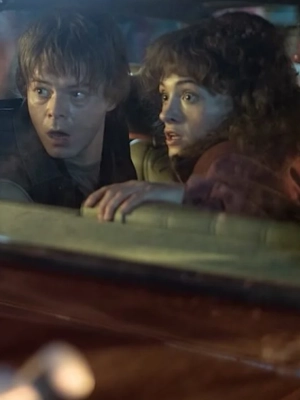Who Do You Think You Are? Episode 3.11 Jason Sudeikis
After cutting his teeth in stand-up comedy, actor Jason Sudeikis got his big break when he became a cast member of "Saturday Night Live." Now he has transitioned to the big screen and works and lives in New York City. Although he considers himself an honorary New Yorker, Jason was raised in Overland Park, Kansas, a suburb of Kansas City. Although there's plenty of information about his mother's side of the family, Jason knows very little about his father's. His grandfather Stanley Sudeikis died when Jason's father was two years old, and his father's mother Edna, a tough lady, lived with Jason's family for as far back as he can remember. Now Jason's at a point in his life where he can appreciate the fact that his dad raised him without having a dad, and he wants to know more.
Jason heads to his hometown, Overland Park, Kansas, to meet with his parents Kathy and Dan, who are ready to take their son on a trip down memory lane. First up is a photo of Jason's grandmother Edna, a single parent from a very young age. Dan admits he knows next to nothing about his dad, save that he was 6'2-1/2" and weighed 195 pounds. At one point, Edna told Dan that Stanley slipped on the ice leaving a Chicago church, broke his neck and died. It could be true, but Stanley's life remains cloaked in mystery. Jason decides to head to Chicago in hopes of unraveling the mystery surrounding his grandfather's death.
Jason meets with genealogist Jeanne Bloom, who has found Stanley's coroner's death certificate, which reports his death at Cook County Hospital after fracturing his skull during a fall on the sidewalk. Stanley's was born on May 26, 1915, and his parents were Stanley Sudeikis and Emma Bielskis, both born in Lithuania, specific location unknown. An Ann Pukel is listed as an "informant," making Jason wonder why his grandmother Edna wouldn't have been the informant. Then he notices Stanley was living at the same residence as Ann Pukel - could she have been a Pollyanna? Since Stanley's death was an accident, and the coroner was brought in, there was an investigation into his death. Jeanne volunteers to meet Jason the next day with the investigation file from the coroner's office.
While waiting for Jeanne to return with the coroner's file, Jason meets with Phil Costello from the Chicago Circuit Court Archives, who has pulled whatever documents he could find on Edna and Stanley, namely a Decree for Separate Maintenance filed May 15, 1947, the year before Stanley's death. Phil explains that this is not exactly a divorce decree, but it would allow husband and wife to live separately. Phil guesses correctly that Jason' grandparents were Catholic, and because of that, divorce may have been forbidden. The document reveals that Edna and Stanley were married on September 25, 1945, and Stanley willfully deserted his new wife that very same day. Could theirs have been a prearranged shotgun wedding to legitimize their children?
A transcript of the court proceedings is included in the case file, revealing that at the time Edna filed for separate maintenance, she had two children, two-year-old Anne Louise, and one-year-old Daniel, Jason's dad. Apparently, Edna and her two children lived with her father, with no support from her husband Stanley, who at the time of the case, had yet to meet his son Daniel. Further, Edna stated that her husband Stanley refused to work. Why would such a strapping young man refuse to work at a time when jobs were so plentiful? Upon reflection, Jason surmises that his grandmother shielded his father from the truth about Stanley. So what led to Stanley's abandonment of his wife and two children?
The next day, Jason meets with Jeanne at a church at 1838 West 50th Street, the scene of Stanley's fatal accident. She hands over the coroner's inquest report on Stanley's death, explaining it's something Jason's going to want to read on his own. Jason sits on the church steps to read the sworn testimony of Ann Pukel, who describes herself as Stanley's cousin. She claims to have last seen Stanley two weeks before his death when he returned to her home to get a shirt. Most of the time he was intoxicated with liquor, but at least on that occasion, he wasn't "staggering." The coroner's office contacted Edna to attend the inquest, but she stated that she wanted nothing to do with Stanley (as did other family members), from whom she had been legally separated for three years. It seems Stanley may have experienced a fatal drunken stumble. With no valuables on his person at the time, he stated that he was on his way to sleep in the park. So it appears that Stanley was homeless, penniless and without a family at the time of his death.
The circumstances surrounding his grandfather's death prompt Jason to wonder about the relationship Stanley had with his father. Jason meets with genealogist Hilary Mac Austin, hoping to learn more about the Sudeikis family line. Hilary has found a marriage record for Jason's grandfather Stanley's marriage to Michelina Bielskis, whom his family knew as Emma, on August 11, 1914. The next place to search is the census on Ancestry.com. Bingo! Stanley and Emma are listed along with Emma's brother Walter, and her son Stanley (Jason's grandfather). Strangely, while Emma isn't listed as widowed, Stanley Sr. isn't listed as a member of the household, though he is listed on the 1920 Bridgeport, Connecticut census - and married to another woman named Mill! Could Stanley have had two families?
Hilary suggests Jason investigate the marriage records for Chicago's Holy Cross Church - the Lithuanian Catholic church of its day - where Stanley and Emma/Michelina were married, while she calls the Cook County Clerk looking for divorce records. In the church records, Jason discovers the names of Emma's parents, Joseph and Marianne. Hilary returns with news that there's no record of Stanley and Emma's divorce, so Jason heads to Bridgeport, Connecticut to see if he can find any records confirming the two Stanleys are one and the same. Genealogist Dr. Bob Rafford meets Jason at Bridgeport City Hall to look for marriage records. It doesn't take long for Jason to learn that Stanley Sudeikis married Amelia Trakaitis in 1918. Stanley's mother's name is recorded as Joseph, his mother, Mary Gash, the marriage listed as his first. The most compelling evidence - the signatures on both wedding certificates look very, very similar.
Jason and Dr. Bob decide to check out Bridgeport's 1930 census on Ancestry.com. There they find Stanley and Amelia listed along with a daughter, Julia. The family owned a $4,600 house, which was quite fashionable in the '30s and remains so today, and Stanley was employed as a gardener on a private estate. It seems obvious that the Bridgeport Sudeikis family has no notion of the Chicago branch of the family. Jason gains more empathy for his grandfather Stanley. Since he grew up without a father, perhaps it was easy for him to abandon his own children. So what was Stanley Sr.'s relationship with his own father? Jason returns to his hotel room and fires up the laptop to investigate Stanley Sr.'s Lithuanian roots. It appears that Stanley Sr. immigrated to America at the age of eight, along with his sister, to join their father Joseph. But did Stanley Sr. ever meet up with his father?
Jason discovers that Joseph was a coal miner with at least eight children living in Manahoy Township, Pennsylvania. Jason travels to Harrisburg to investigate with the help of mining historian Stu Richards. Stu informs that most likely Joseph would have arrived without his family, looking for work in the mines, then worked to gradually bring his family to the U.S. A search of the Mining Safety and Health Administration website yields little information about Manahoy Township in 1900 - only that seven miners died in an explosion. Stu offers to search the archives and returns with a mighty tome, a coroner's report, which indicates Joseph did indeed die in a mine explosion. When Jason wonders how a miner could survive at that time, Stu offers to take him below the surface of the earth to learn what life might have been like for Joseph.
Deep in the bowels of the earth, Stu pulls out an old miner's cloth hat (not helmet), circa 1900, which features a hempen wick attached to its front. That's right, all miners would carry the dim light of live flame on their heads at all times. So what happened when a miner unknowingly stuck his head into a pocket of gas? A horrendous explosion would gush through every orifice of the mine, engulfing men, mules, whatever was in its path - which is exactly what happened to Joseph. Upon reflection, Jason decides that he's glad that his father, Daniel Joseph, shares his name with his great-grandfather, because both of them seemed to live by the motto family first, despite the Sudeikis' pattern of paternal abandonment.
Jason returns to his parents' house to report back on his journey through Sudeikis family history. He starts the story in Chicago, reporting the fact that Stanley never met his son Dan, never paid child support, refused to work and died homeless, penniless and family-less at 32 years old. Regardless of the sadness of this story, Jason hopes this information can bring Dan some sense of closure; he then launches into the story of Joseph. Jason's sister remarks that Jason is the first Sudeikis son to grow up with his father, which all things considered, is a remarkable feat - it sheds a whole new light on Dan's dedication to fatherhood. For his part, Jason looks forward to the incredible pressure of having a child of his own, especially now that he knows that this kind of pressure is incredibly rewarding.









